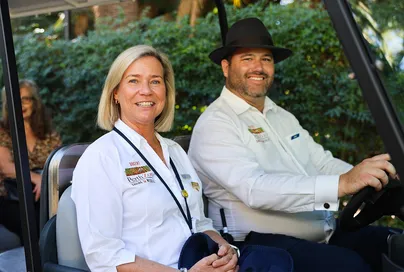Pets can offer many benefits for your overall health. Learn what to consider before bringing one home.

Pets (especially dogs) can offer many physical, mental, and emotional benefits as you age. But there are a few things to think about before welcoming one into your life.
These include financial, practical, emotional, and physical health challenges. Older adults can also be more vulnerable to some of these risks.
Let’s look at some of the positives and potential challenges of owning a pet.
What are the positives of owning a pet?
Caring for a beloved pet can have many emotional and physical health benefits. These benefits include:
- Improving your mental health
- Supporting social connections
- Increasing your exercise and fitness
- Helping you manage some health conditions
How do pets do all this for you? Let’s get into it:
Improved mental health
Pets can be a wonderful source of comfort and companionship as you get older. A 2022 review from Aging & Mental Health found that having a pet is linked to lower levels of:
- Depression
- Loneliness
- Anxiety
One reason for this may be that looking after a pet involves regular activity. It often includes tasks like feeding, grooming, or walking the dog. All these activities can help structure your day. A daily routine makes it easier to build and maintain healthy habits that support your mental health and wellbeing.
Caring for an animal can also give you a greater sense of purpose and help you stay focused on the present moment. This is known as mindfulness. It means paying attention to what is happening right now without judgment. Pets naturally encourage this.
Why should you be mindful? Research in Frontiers in Human Neuroscience shows that practising mindfulness can reduce stress and even support your memory.
Fun fact: Dogs are especially good at encouraging mindfulness.
A 2021 Australian study published in Animals found that spending a few mindful minutes with your dog can help you feel calmer and more connected. These mindful moments might include:
- Sitting quietly
- Playing together
- Simply giving your dog your full attention for a few minutes
This practice can be just as effective as a guided mindfulness exercise.
Improved social connectedness
Pet owners often find community in fellow animal lovers. This can be from:
- Chatting with others about pets
- Joining an online group for similar pet enthusiasts (such as cats or birds)
- Attending local pet-friendly events
It’s worth remembering just how important social connections are to your health. Staying socially active is as important as eating well and staying physically active. A strong sense of community supports your independence and overall health.
Fun fact: Dogs are especially good at making you more social.
A dog may help you get out into the community more often. You can meet people while going for walks or spending time at dog parks.
Increased physical activity
Having a pet can increase how much incidental exercise you get each day. That’s the kind of movement you do without necessarily meaning to exercise. This could include walking your dog, playing with a cat, or cleaning up after your pet. These small, everyday tasks keep you active and support your heart and overall physical health.
Fun fact: Dogs are especially good at helping you stay active.
One large Australian study, published in PLOS One, found that people with dogs were less likely to die over a 4-year period than those without pets or with other types of pets. This may be thanks to the regular exercise and companionship a dog can offer.
Another study, published in BMC Public Health, found that dogs helped people feel safer walking around their neighbourhood. This helps dog owners be more active. It also helps build a stronger sense of community.
Helps with managing chronic conditions
Spending time with pets can support your physical health in ways that may help with managing chronic conditions. For example:
- A 2020 review from Clinical Gerontologist found that pets can improve your blood pressure and cardiovascular health. This can be helpful if you have a heart condition.
- The same study also found that pets have even been shown to help reduce the symptoms of dementia.
- Arthritis Australia says exercise is one of the most effective treatments for arthritis. So, daily walks with a dog may help ease arthritis symptoms.
So, what’s not to love about pets?
What are the negatives of owning a pet?
There can be negative impacts when it comes to owning a pet. Some of the potential problems of pet ownership include:
- Increased risk of injury or tripping
- Increased risk of allergy and some diseases
- Emotional risk of feeling deep sadness after a pet passes away
- Struggling to meet the financial and physical demands of caring for a pet
But what exactly do these risks mean for you, and how can you address them? Let’s get into it:
Increased risk of accident, allergy, or disease
A cat or dog might occasionally get under your feet or behind your ankles. This can be a trip hazard, particularly if your balance isn’t as strong as it used to be.
There’s also the potential for allergic reactions or the transmission of certain diseases. For example, toxoplasmosis can be found in cat litter. This is mainly a concern for people with weakened immune systems or pregnant women, according to Healthdirect.
How to address the health risks of owning a pet
If you’re at risk of falling, think carefully about whether a pet might add to that risk. You can also read more about how to prevent falls at LiveUp.
You should also consider whether you or your loved ones might be vulnerable to illnesses animals can carry. For example, if you have a pregnant woman in your life, she should avoid handling cat litter trays or very young kittens, as this could pose a risk to her baby’s health.
If you're unsure how these risks might apply to you, speak with your doctor for tailored advice.
Emotional and practical challenges
Owning a pet can come with emotional challenges, too. It’s possible to form a strong emotional dependence on your furry friend, so it’s important to think about how you would cope with illness or the loss of a pet.
Practical issues can also add to the emotional strain. This can be due to the financial or physical demands of pet care. For example, your responsibilities may include:
- Paying for pet food and vet bills
- Cleaning up after your pet
- Providing regular exercise and enrichment
If these responsibilities become overwhelming, they can cause stress or anxiety – especially if you’re worried about giving your pet the care it deserves. According to the 2022 review from Aging & Mental Health, in some cases, people have even delayed their own medical care to continue looking after their pet.
How to prepare for the practical challenges of pet ownership
It’s important not to compromise your own health when caring for a pet. Choose an animal that suits your lifestyle and capabilities.
Think about how much it will cost to keep your pet healthy and happy, and whether you’ll be able to meet its daily needs. For example, if regular walking isn’t possible for you, it may not be the best idea to adopt a dog that needs a lot of exercise.
Make sure you have a support network that can step in to help if needed. It’s also worth having a backup plan in case you need time away from your pet – whether for medical care or even just a holiday.
Support for pet care
You can reach out to local organisations if you need help caring for your pet. Many humane societies, animal shelters, or foodbanks can offer support with pet food.
Other organisations may help with the physical demands of pet care. For example, volunteers from POOPS WA (Pets of Older Persons WA) can help with:
- Dog walking if you are unable to exercise your dog
- Pet transport to veterinary appointments, grooming sessions, or boarding facilities
And they do it free of charge, so you never have to part with your pet due to age.

Watch this video to hear from clients and volunteers at POOPS WA.
What’s the takeaway?
Despite the challenges, a 2022 Australia-wide survey from Animal Medicines Australia found that over 85% of companion animal owners felt their animals had a positive impact on their lives.
So, when it comes to pets and healthy ageing, what should you take away from this list of pros and cons? Simply this: it’s important to weigh up the positives and the challenges before deciding if a pet is right for you.
If pet ownership feels right for you, take your time to find an animal that suits your lifestyle. If it isn’t, there are still many ways to enjoy the benefits of being around animals. You can spend time with animals by:
- Visiting a cat café
- Volunteering at animal shelters
- Going to cuddly animal farms or animal sanctuaries
- Attending therapy dog sessions at your local library
Take your time to choose what works for you.
If you need more information about healthy ageing, you can take the LiveUp quiz or call one our team members on 1800 951 971.
References
Animal Medicines Australia. (2022). Pets in Australia: A national survey of pets and people. https://animalmedicinesaustralia.org.au/report/pets-in-australia-a-national-survey-of-pets-and-people-2/
Applebaum, J. W., & McDonald, S. E. (2022). Pets, older adults, and social connectedness during COVID-19: An exploration of the roles of pets in managing social isolation. Aging & Mental Health, 28(5), 783–793. https://doi.org/10.1080/13607863.2022.2141196
Christian, H., Wood, L., Nathan, A., Kawachi, I., Houghton, S., Martin, K., & McCune, S. (2016). The association between dog walking, physical activity and owner’s perceptions of safety: Cross-sectional evidence from the US and Australia. BMC Public Health, 16, 1010. https://doi.org/10.1186/s12889-016-3659-8
Healthdirect. (2024). Toxoplasmosis. https://www.healthdirect.gov.au/toxoplasmosis
Hughes, M. J., Verreynne, M. L., Harpur, P., & Pachana, N. A. (2020). Companion Animals and Health in Older Populations: A Systematic Review. Clinical gerontologist, 43(4), 365–377. https://doi.org/10.1080/07317115.2019.1650863
National Institutes of Health. The power of pets. NIH News in Health. https://newsinhealth.nih.gov/2018/02/power-pets
Norris, C. J., Creem, D., Hendler, R., & Kober, H. (2018). Brief Mindfulness Meditation Improves Attention in Novices: Evidence From ERPs and Moderation by Neuroticism. Frontiers in human neuroscience, 12, 315. https://doi.org/10.3389/fnhum.2018.00315
Oliva, J. L., & Green, T. R. (2021). Dog Tales: Mindful Dog Interactions Evoke Similar Experiences to Dog Assisted Mindfulness Meditations. Animals, 11(7), 2104. https://doi.org/10.3390/ani11072104
Taniguchi, Y., Ikeuchi, T., & Yong, J. (2024, August 14). Dog, cat, bird, fish, and other pet ownership and mortality: Evidence from the HILDA cohort. PLOS ONE. https://doi.org/10.1371/journal.pone.0305546
Y.C. Yang, C. Boen, K. Gerken, T. Li, K. Schorpp, & K.M. (2016). Harris, Social relationships and physiological determinants of longevity across the human life span, Proc. Natl. Acad. Sci. U.S.A. 113 (3) 578-583, https://doi.org/10.1073/pnas.1511085112
Arthritis Australia. https://arthritisaustralia.com.au/managing-arthritis/living-with-arthritis/physical-activity-and-exercise/
How to use this information
LiveUp provides free information to help you make informed decisions about your health. This information is for general and educational purposes only, is not intended to provide a comprehensive guide, and does not replace medical advice. Everyone is different, so some of these tips may work better for you than others. You should use your own judgment and seek medical advice when applying this information to yourself, to determine if it is suitable in your circumstances. Your use of, or reliance on, this information is solely at your own risk. Independent Living Assessment Incorporated is not responsible or liable for any injury, loss, or damage caused as a result of your use of, or reliance on, this information.
Download and print this article:
You can print out the PDF and stick it to your fridge or file away the tips to revisit at a later time.

Read more Social articles
Did you enjoy this article? You may also like reading similar healthy ageing articles.
See all Social articles

